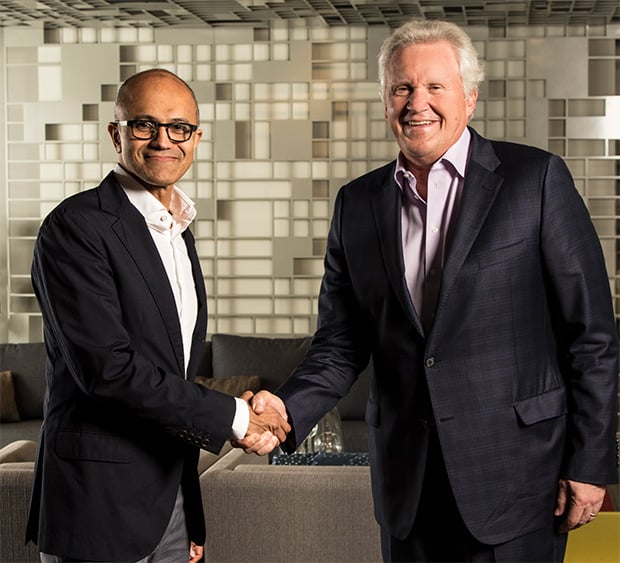Microsoft And GE Meld Predix OS With Azure Cloud Platform To Create IoT Dynasty
Microsoft's been laser focused on the cloud as of late, and in particular the growing Internet of Things (IoT) market that's comprised of Internet connected devices. With an eye towards the industrial side, Microsoft and GE are partnering up to bring the latter's Predix platform to the former's Azure cloud service. It's the first step towards what the two companies envision as a broad strategic collaboration.
"Every industry and every company around the world is being transformed by digital technology,” Microsoft CEO Satya Nadella said in a statement. "Working with companies like GE, we can reach a new set of customers to help them accelerate their transformation across every line of business — from the factory floor to smart buildings."

The IoT market is booming. Market research firm Gartner predicts there will be in the neighborhood of 6.4 million connected devices around the world by the end of the year, and more than 20 billion by 2020. With that type of growth on the horizon, Microsoft and GE decided that bringing Predix and Azure together makes a lot of sense, one that will makes things easier on industrial customers.
"Connecting industrial machines to the internet through the cloud is a huge step toward simplifying business processes and reimagining how work gets done," said Jeff Immelt, CEO of GE. "GE is helping its customers extract value from the vast quantities of data coming out of those machines and is building an ecosystem of industry-leading partners like Microsoft that will allow the Industrial Internet to thrive on a global scale."
By teaming up with Microsoft, GE's Predix customers will have access to one of the biggest cloud platforms available. However, that's just the tip of the iceberg—GE and Microsoft plan to integrate Predix with Azure IoT Suite and Cortana Intelligence Suite along with a handful of Microsoft business applications, such as Office 365, Dynamics 365, and Power BI, to mesh industrial data with businesses processes and analytics.
In plain English, the collaboration and future plans means that customers will have access to a lot more data to help see what strategies work best and to streamline their operations.
"Every industry and every company around the world is being transformed by digital technology,” Microsoft CEO Satya Nadella said in a statement. "Working with companies like GE, we can reach a new set of customers to help them accelerate their transformation across every line of business — from the factory floor to smart buildings."

The IoT market is booming. Market research firm Gartner predicts there will be in the neighborhood of 6.4 million connected devices around the world by the end of the year, and more than 20 billion by 2020. With that type of growth on the horizon, Microsoft and GE decided that bringing Predix and Azure together makes a lot of sense, one that will makes things easier on industrial customers.
"Connecting industrial machines to the internet through the cloud is a huge step toward simplifying business processes and reimagining how work gets done," said Jeff Immelt, CEO of GE. "GE is helping its customers extract value from the vast quantities of data coming out of those machines and is building an ecosystem of industry-leading partners like Microsoft that will allow the Industrial Internet to thrive on a global scale."
By teaming up with Microsoft, GE's Predix customers will have access to one of the biggest cloud platforms available. However, that's just the tip of the iceberg—GE and Microsoft plan to integrate Predix with Azure IoT Suite and Cortana Intelligence Suite along with a handful of Microsoft business applications, such as Office 365, Dynamics 365, and Power BI, to mesh industrial data with businesses processes and analytics.
In plain English, the collaboration and future plans means that customers will have access to a lot more data to help see what strategies work best and to streamline their operations.

